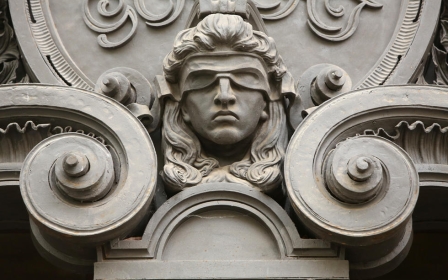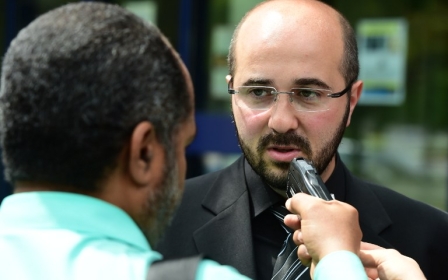Germany to investigate detention of Al Jazeera journalist

Germany has promised to reveal the circumstances surrounding the recent arrest of an Al Jazeera journalist, as controversy surrounding his three-day detention in Berlin continues to swirl.
Ahmed Mansour, 52, was released by a Berlin court on Monday after police arrested him at Berlin’s Tegel Airport on Saturday.
Mansour confirmed during a press conference on Tuesday that his arrest in Germany was related to charges levelled against him by an Egyptian court in 2014.
A judge in Cairo last October sentenced Mansour to 15 years in prison for rape, theft and torturing a lawyer in Tahrir Square, where he was working covering anti-government protests for the Arabic arm of the Qatari-owned news outlet.
Mansour has previously dismissed the charges as “absurd,” and said on Tuesday that his detention in Germany was politically motivated.
“Last February I was in Germany … and nobody stopped me in any airport,” he said during an interview with Al Jazeera.
“This time they arrested me after [Egyptian President Abdel Fattah al-]Sisi’s visit.”
Sisi was in Berlin in early June to visit German Chancellor Angela Merkel – during the visit, Merkel criticised human rights abuses in Egypt, and said the death penalty should never be used, even in "terrorism" cases.
The trip also saw a troubled German electronics giant sign a mega-deal with Cairo aimed at boosting Egypt’s electricity generation by up to 50 percent.
The deal, described by Siemens as the biggest in its history, will see the German company build gas and wind plants in Egypt worth up to $9 billion.
In the wake of Mansour’s comments, Germany's interior ministry has denied allegations that the arrest was politically motivated – officials have pointed to an Egyptian request made in October 2014 for Interpol, the organisation that facilitates international arrests, to put out a “red notice” to member states asking for Mansour’s arrest.
However, days after the request was made, Interpol informed members that it saw the arrest warrant as politically motivated, breaching its rules against interventions "of a political, military, religious or racial character".
Speaking during a press conference in Berlin on Tuesday, Mansour alleged that the Egyptian government had “succeeded in using some people in the German government for its purposes”.
"I fear that the Sisi regime - the dictatorial regime, the tyrannical regime - was successful in perhaps exporting ... their dictatorship to Germany," said Mansour, challenging local journalists to dig out the truth.
The case caused outrage and bafflement in Germany, with the Association of German Journalists telling Middle East Eye that "arbitrary accusations from a government that does not respect freedom of the press should not lead to the detention of any journalist”.
In the wake of domestic outcry, a judicial council of the German parliament will launch an investigation into the decision to apprehend Mansour, a dual British and Egyptian national.
The country’s interior ministry said on Tuesday that it was “working under extreme pressure to clarify the circumstances of the case”.
A foreign ministry source blamed a miscommunication for the arrest, telling AFP that Egypt's initial requests had given no clues about Mansour's "activity as a well-known journalist nor an obvious political background".
"It was only after the arrest of Ahmed Mansour that the Egyptian side at the weekend submitted a preliminary extradition request with further information to the government," the source said.
"An examination of these documents quickly made clear that an extradition of Ahmed Mansour to Egypt would be completely ruled out."
Cairo, meanwhile, is adamant that Mansour’s innocence has yet to be proved.
A judicial source quoted in the state-owned al-Ahram newspaper on Tuesday said that “Mansour’s release does not mean he is innocent,” stressing that authorities would continue to demand his extradition back to Egypt.
New MEE newsletter: Jerusalem Dispatch
Sign up to get the latest insights and analysis on Israel-Palestine, alongside Turkey Unpacked and other MEE newsletters
Middle East Eye delivers independent and unrivalled coverage and analysis of the Middle East, North Africa and beyond. To learn more about republishing this content and the associated fees, please fill out this form. More about MEE can be found here.




